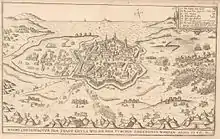
Dimitrije Ovčarević (Serbian Cyrillic: Димитрије Овчаревић; fl. 1552–66) was a Habsburg Serb nobleman. Dimitrije Ovčarević belonged to the Ovčarević family, a notable Serb family in Habsburg service in the 16th century, and was a relative of the earlier Petar Ovčarević (fl. 1521–41), a Šajkaši commander and spy, and contemporaries Mihailo Ovčarević (fl. 1550–79), a Šajkaši commander, and Jovan Ovčarević (fl. 1557), an emissary.[1] In 1552 he is mentioned as a leader of the Serbs in Banat,[2] and in 1553 as the captain of Gyula.[3] He was very loyal to King Ferdinand I and enjoyed his support.[2] In 1556 it was planned that he travel to Vienna to meet Ferdinand for some business, however, the king asked him to postpone due to Ottoman movement.[2] The same year he was given to govern a part of the Csanád chapter until its populating,[2] in order to maintain troops.[3] The king often used Church property, due to financial shortage, to pay the voivodes' expenses and troop maintenance.[3] Dimitrije also held the estates of Kerekegyháza and Nagyfalu in the Temes County; Turegyház, Bócsar, Bikács and Szanád in the Torontál County; Mezőtakancs and Délegyháza in the Csanád County;[3] Csokás, parts of Szentpéter, Fenlak, Variaș, Torny, Bata in the Arad County; and Marian and Kétegyháza in the Zărand County.[2] The royal treasurer paid the maintenance of 85 cavalry, several dozen being under Dimitrije's command.[3] In war-time this number increased significantly.[3] Other captains mentioned in the muster were Vladislav Kerecseny, Pavle Beke, Franja Horvat and others alongside Dimitrije.[3] When the Ottoman army set out on campaign in 1566, a part of the army attacked Transylvania and surrounded Gyula.[2] Dimitrije fell while bravely defending the city.[4] Many castellans and captains died during the Ottoman campaign of 1566.[3] Shortly after his death, the city surrendered to the Ottomans.[3] He was survived by his sister Margarita, who was married to Nikola Crepović, a respected Serb leader in Banat.[2]
References
- ↑ Kolundžija 2008, p. 216, Popović 1957, p. 159
- 1 2 3 4 5 6 7 Popović 1957, p. 159.
- 1 2 3 4 5 6 7 8 9 Stojkovski 2015, p. 216.
- ↑ Stojkovski 2015, p. 216, Popović 1957, p. 159
Sources
- Ivić, Aleksa (1929). Istorija srba u Vojvodini. Izdanje matice srpske. pp. 177, 179, 186, 189.
- Kolundžija, Zoran (2008). Vojvodina: Od najstarijih vremena do velike seobe. Prometej. p. 216. ISBN 9788651503064.
- Popović, Dušan J. (1957). Srbi u Vojvodini (1): Od najstarijih vremena do Karlovačkog mira 1699. Matica srpska. p. 159.
- Stojkovski, Boris (2015). Đura Hardi (ed.). "The cultural and historical heritage of Vojvodina in the context of classical and medieval studies". Novi Sad: Filozofski fakultet. pp. 205–222.